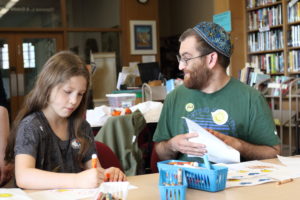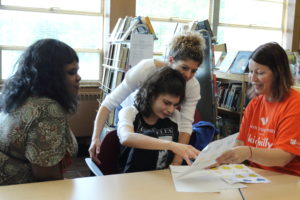
In the early days of the pandemic, Jewish Learning Venture Chief Program Officer and Whole Community Inclusion Director Gabrielle Kaplan-Mayer noticed a lot of complaints from people unable to eat in restaurants.
Having an autistic child with a sensory disability, Kaplan-Mayer and her family had adapted to getting take out and eating at home long before COVID-19 began. But her observation struck a chord nonetheless.
“For a moment, many nondisabled people had an opportunity to see what it’s like to be isolated in their homes,” Kaplan-Mayer said.
COVID has changed the way people think about disability and accessibility, Kaplan-Mayer said. People without disabilities are taking advantage of access tools, such as Zoom, that disabled people have been using for a long time.
The right to work from home is something disabled people fought for decades before COVID, Kaplan-Mayer said. Now that so many people are working from home, work flexibility and access tools have become commonplace, and advocates for disability justice and accessibility are experiencing their work come to fruition.
On this year’s Jewish Disability Awareness, Acceptance and Inclusion Month during February — a national effort since 2009 for Jews to coalesce around disability justice — disability inclusion and justice advocates are hoping that a greater focus on accessibility in the age of COVID sticks, even after the pandemic is over.
“This moment is really important, so we don’t just stop and be like, ‘When it’s safe, everyone go back,’” Kaplan-Mayer said. “Because we’ve learned how technology can support access in so many different ways.”
By highlighting the work of disability inclusion and awareness in February, there’s a greater chance that those not thinking about accessibility from March through January will think about it more deeply year-round.
“It’s not just a month,” Philly Friendship Circle co-founder and Executive Director Rabbi Zev Baram said. “Take whatever the focus is on this idea of inclusion — take it beyond just the weekend you hear about it, or the month that we’re recognizing it, and be able to interact with that concept throughout the year.”
Philly Friendship Circle, a nonprofit working to build friendships between disabled and nondisabled young adults and children, is part of Whole Community Inclusion, a part of Jewish Learning Venture which hosts jkidaccess, a program focused on disability inclusion.
On JDAIM, jkidaccess brings together many area Jewish organizations and leaders to hold events; synagogues are encouraged to host a Shabbat during the month centered on the topic of disability inclusion or accessibility.
Philly Friendship Circle is co-sponsoring a dialogue with Central Jersey-based synagogue educator Lisa Friedman on inclusive grandparenting.
The dialogue will focus on ways in which grandparents can manage the expectations of their grandchildren with disabilities and adapt to support their needs.

Like Kaplan-Mayer, Friedman believes COVID has already made families think differently about access.
“In a world where everything went to FaceTime and Zoom and Facebook Portal … suddenly [grandparents] have embraced those tools in different ways,” Friedman said. “It actually has been beneficial to grandparenting relationships.”
In a time when COVID has complicated so many lives, for some of those caring for disabled kids, the pandemic has made life easier in some ways.
Parents with immunocompromised children who had put in a great deal of planning to take their children safely outside are now in good company, Friedman argued.
“Suddenly, the whole world is speaking about those things,” Friedman said. “In some ways, it leveled the playing field for people.”
The greater awareness of accessibility and need for access tools has taken place in synagogues and Hebrew school classes, too.
“Our synagogues or educational leaders have become much more aware that teachers need professional development and training to know how to support kids,” Kaplan-Mayer said.
In 2021, Jewish Learning Venture piloted a yearlong training program for six jkidaccess guides to get a “deep dive into understanding disability inclusion and family engagement.”
Guides learned how to create quiet spaces or prepare alternative activities for children with fine motor or sensory disabilities.
Jewish Learning Venture received a 2022 Covenant Foundation Signature grant for $100,000 over two years to not only expand the jkidaccess guides training but to financially support synagogues in partnership with Jewish Learning Venture interested in creating unique initiatives to support accessibility, such as creating Jewish holiday kits for families.
Grants such as the one from the Covenant Foundation allow for disability inclusion work to be done year-round and become a more foundational part of Jewish community infrastructure, Kaplan-Mayer argued.
“There’s a shift in the greater consciousness as we think about diversity, equity and inclusion in the big picture — realizing, maybe in the Jewish community, we haven’t thought so much about disability issues,” Kaplan-Mayer said. “I love that hopefully folks are thinking about things in a different way.”
A complete listing of JDAIM events from Jewish Learning Venture can be found at jewishlearningventure.org/calendar.
[email protected]; 215-832-0741




I was pleased to read the article about inclusion of children with disabilities in religious activities. Way back in 1980 my vision impaired daughter was excluded from my cousins mt.airy bat mitzvah celebration . It was erroneously thought that she would need special attention and distract from the ceremony. What a contradictory statement. Something was surely lacking in the values conveyed in bari sue,s religious education.
No exclusion occurred when my daughter was accepted for admission to Princeton and MIT